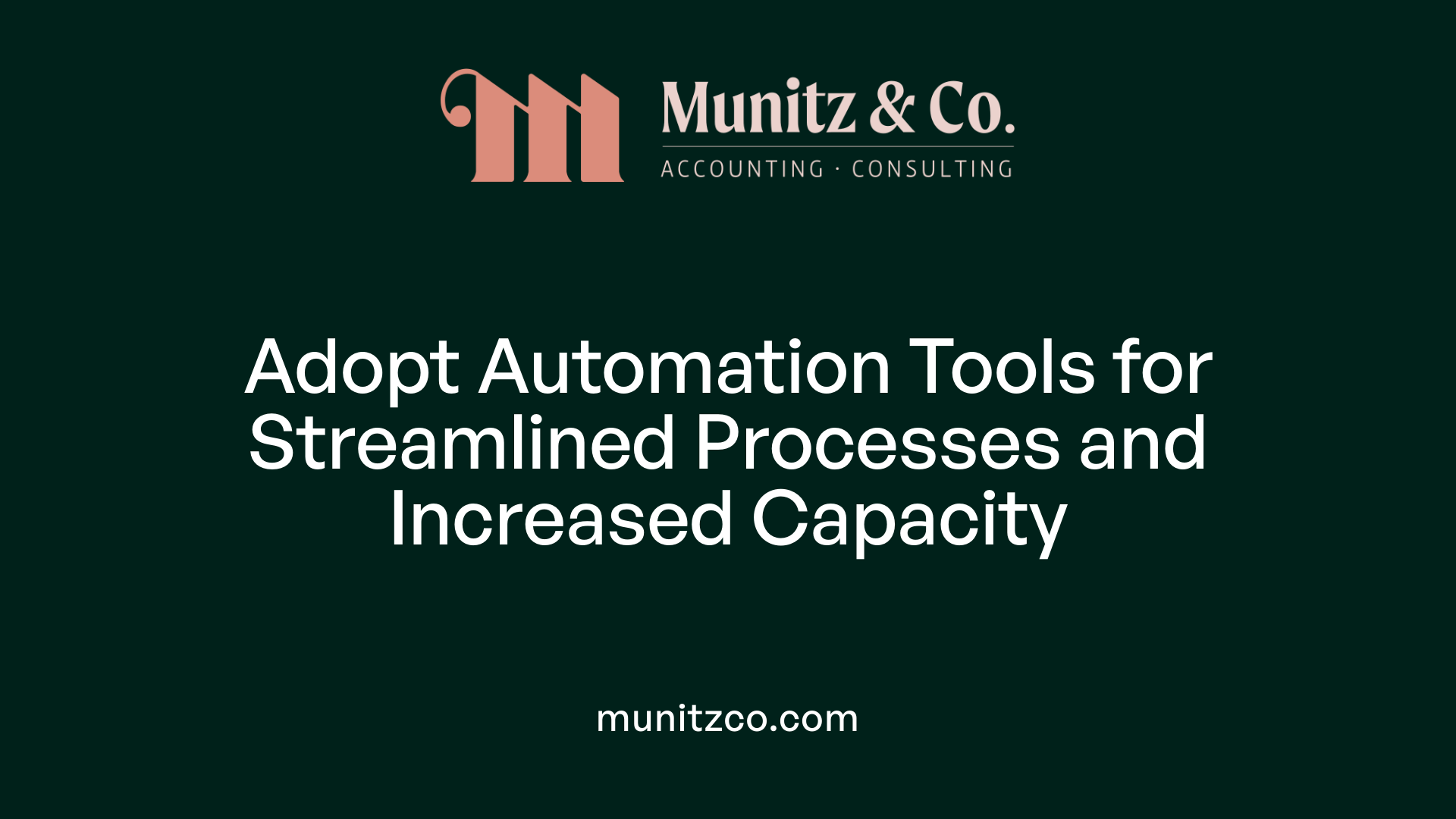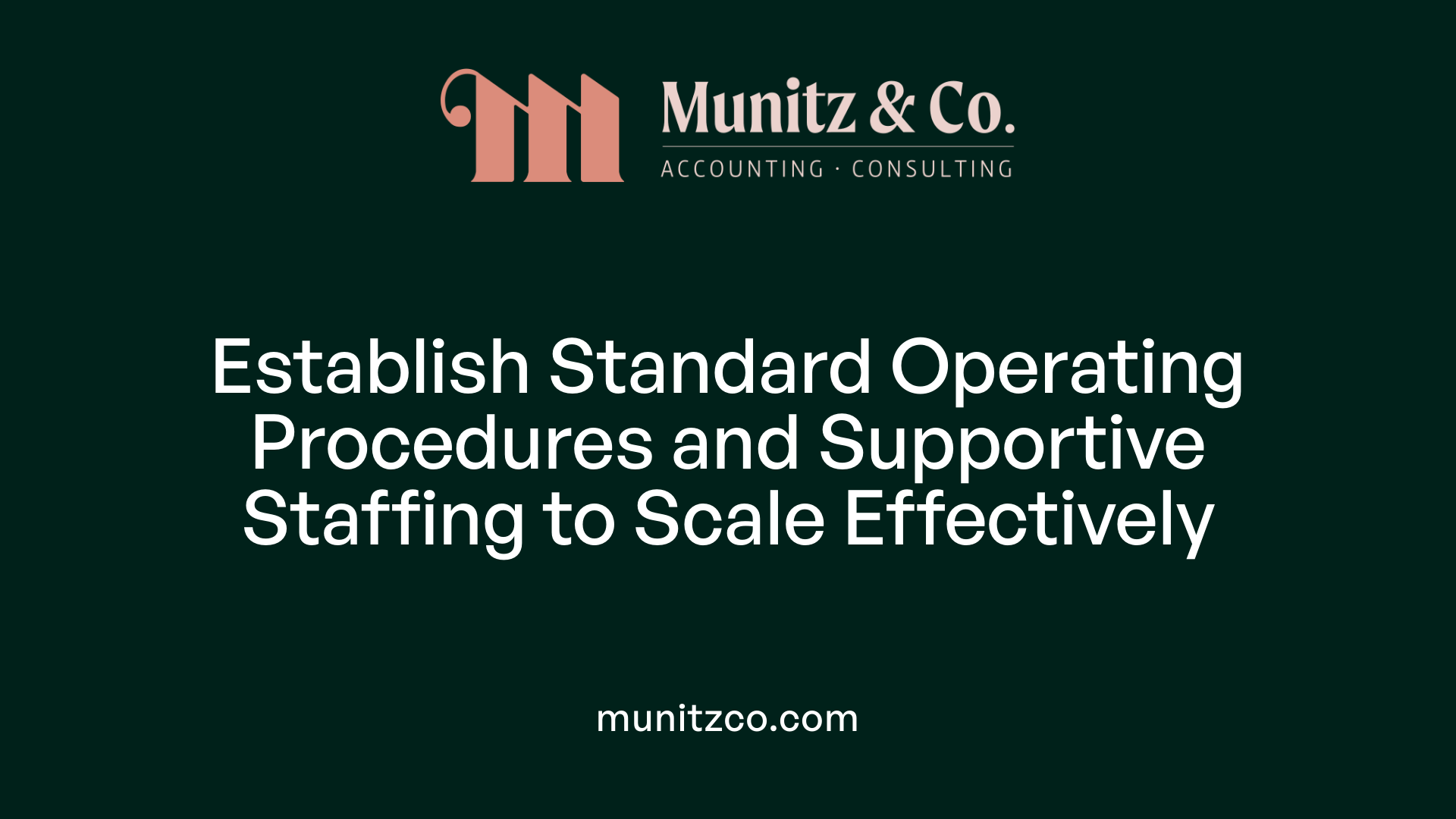Balancing Expansion with Financial Health
Scaling an accounting or financial firm offers exciting opportunities for growth, but it also introduces complexity and financial risks. Firms must navigate increased transaction volumes, evolving client needs, and operational challenges — all while preserving profitability and ensuring sustainable growth. This article explores key strategies and financial metrics essential for accounting firms aiming to scale without losing sight of profitability, highlighting practical internal improvements, automation technologies, and strategic advisory offerings.
Leveraging Automation and Technology to Boost Efficiency

How can accounting firms automate their processes for scalable growth?
Accounting firms can significantly enhance their scalability by adopting AI-powered accounting tools. For instance, Digits' Autonomous General Ledger automates over 93% of financial transactions. This level of automation not only accelerates closing processes but also minimizes manual cleanup, allowing firms to handle higher volumes efficiently.
Automation in transaction processing
Automation platforms like Zapier and Notion also play a crucial role by managing repetitive tasks such as report generation and client onboarding. These technologies reduce the administrative workload, enabling staff to focus on value-added activities while enhancing the firm's operational capacity without immediate increases in headcount.
Streamlining onboarding and client communication
Client onboarding and communications are made seamless through automation portals, which reduce administrative overhead and improve client experience. Streamlined processes help maintain high satisfaction levels, which are essential for client retention and business growth.
Software tools for report generation and task automation
Incorporating software tools for generating reports and handling routine functions contributes to overall productivity. These tools help firms maintain accuracy and consistency while freeing up valuable time for strategic planning and advisory services.
Together, these automation strategies enable accounting firms to grow sustainably, improve turnaround times, and better serve their clients without proportionally increasing costs or staffing.
Implementing Standardized Processes and Early Staffing for Scalability

What internal processes help accounting firms scale effectively?
Accounting firms looking to scale efficiently benefit greatly from establishing standardized processes supported by detailed Standard Operating Procedures (SOPs). These SOPs create a consistent workflow, ensuring that tasks are completed uniformly across the team. This consistency not only improves turnaround times but also aids in maintaining high-quality deliverables.
Clearly documented SOPs are essential for training new hires effectively. When new administrative and support staff join the team, they can quickly learn their roles through these guidelines, reducing onboarding time and increasing productivity.
Alongside these procedures, hiring additional support staff early—particularly before busy periods like tax season—helps firms proactively manage workload spikes. This strategic staffing allows firms to maintain service levels without overburdening existing employees.
By combining comprehensive documentation with timely staffing, accounting firms create scalable internal processes that can handle increased transaction volumes and complexity as they grow.
Strategic Financial Metrics to Monitor for Profitable Growth

Key performance indicators (KPIs) for scalability and profitability
When scaling a firm, tracking specific financial metrics is crucial. Important KPIs include the working capital ratio, operating cash flow, current ratio, cash flow forecasting, and profitability indicators such as profit margins and return on investment metrics. These metrics give a comprehensive snapshot of a firm's financial health, helping leaders make informed decisions.
Working capital ratio norms
The working capital ratio, which measures a firm’s ability to cover its short-term liabilities with its short-term assets, typically should fall between 1.2 and 2.0. Ratios outside this range may signal inefficiencies or an excess of idle assets that could hinder growth.
Operating cash flow and cash flow forecasting
Operating cash flow reflects the cash generated through core business operations, serving as a key liquidity indicator during expansion. Cash flow forecasting is equally important, as it estimates future cash positions, allowing firms to prepare for funding needs and avoid insolvency risks during periods of growth.
Profit margins and return on investment metrics
Profit margins, both gross and net, reveal how effectively a firm controls costs and generates income. Gross profit margin highlights profit after costs of goods sold, while net profit margin shows the overall percentage of revenue turned to profit. Additionally, returns on investment (ROI), equity (ROE), and assets (ROA) measure profitability and efficiency, guiding strategic allocation of resources and operational improvements.
Which financial metrics are essential to track when scaling a firm?
To summarize, accounting firms should monitor KPIs such as a working capital ratio between 1.2 and 2.0, operating cash flow, current ratio for short-term debt coverage, cash flow forecasting, and profitability ratios like gross and net profit margins. Return on investment, return on equity, and return on assets offer insights into financial efficiency. Collectively, these metrics assist in making well-informed strategic growth decisions without compromising profitability.
Expanding Services and Specializing to Drive Revenue Growth
How can firms increase revenue while scaling?
Accounting firms can significantly boost revenue by focusing on niche specialization. By targeting specific sectors such as SaaS companies or small business services, firms can charge premium rates, attract higher-value clients, and generate more referrals. This targeted approach allows firms to position themselves as experts, which enhances client trust and willingness to invest in high-quality services.
Offering scalable service packages further supports revenue growth. Services like monthly bookkeeping, virtual CFO roles, and automated sales tax compliance provide repeatable, profitable offerings that clients can easily adopt and upgrade over time. This consistent service framework ensures steady cash flow and simplifies operational scalability.
In addition to core accounting work, expanding advisory roles is a potent growth strategy. Services including M&A consulting, strategic planning, and virtual CFO support deepen client relationships and open up fresh revenue streams. These offerings shift firms towards becoming trusted partners rather than just service providers.
Finally, transitioning from traditional hourly billing to value-based or subscription pricing models helps stabilize revenue. Such pricing reflects the actual value delivered to clients, allowing firms to serve more clients profitably while promoting predictable income and client satisfaction.
| Strategy | Description | Benefits |
|---|---|---|
| Niche Specialization | Focus on industries like SaaS or small business services | Premium pricing, higher-value clients, referrals |
| Scalable Services | Monthly bookkeeping, virtual CFO, automated compliance | Repeatable revenue, operational ease |
| Advisory Expansion | M&A consulting, strategic planning, virtual CFO | New revenue channels, deeper client relationships |
| Pricing Model Shift | Move to value-based or subscription pricing | Stabilized income, reflects service value |
Effective Client Acquisition and Retention Strategies

What strategies help accounting firms attract and retain clients when scaling?
Building a powerful marketing engine is essential for accounting firms aiming to scale successfully. This involves combining SEO techniques, content marketing, advertising campaigns, and referral programs to attract high-value clients that align with the firm’s specialization. SEO and content efforts increase online visibility and position firms as trusted advisors, drawing in prospects actively searching for accounting expertise.
Referral programs serve as a sustainable client acquisition channel by leveraging existing satisfied clients’ networks. Encouraging referrals not only accelerates client growth but also tends to bring in loyal clients who value personalized services.
Once new clients come on board, streamlining the onboarding process through client portals and automation reduces administrative burdens and enhances the client experience. Automated onboarding tools ensure faster setup and fewer errors, which contributes to higher client satisfaction.
Managing ongoing relationships is equally important. Using CRM tools allows firms to proactively engage clients, offering personalized financial insights and strategic tax planning. This proactive approach demonstrates value beyond routine accounting tasks, boosting client retention and loyalty.
Overall, these strategies help firms achieve consistent demand, maintain profitability, and support scalable growth through strong client acquisition and retention practices.
Engaging Fractional CFOs and Outsourcing for Strategic Growth
How can fractional CFOs and outsourcing support scalable growth?
Fractional CFOs play a vital role in helping growing firms manage the complexities of scaling. They offer strategic decision-making support, develop key performance indicators (KPIs), provide financial modeling, and handle tax and compliance guidance. Importantly, they prepare businesses for investor readiness. These services are especially crucial for companies experiencing rising revenues without clear profits or those planning expansions but lacking a full-time CFO.
Outsourcing accounting functions complements this by giving access to expert teams that can handle increasing transaction volumes, manage complex fund and grant reporting (especially for nonprofits), and deliver timely, sophisticated financial reports. Outsourced professionals leverage advanced technology and automation to improve accuracy and efficiency, freeing internal teams to focus on core business activities.
Selecting outsourcing partners
When choosing an outsourced accounting partner, it’s essential to evaluate several factors:
- Industry Experience: Familiarity with your sector ensures relevant expertise.
- Service Range: Comprehensive offerings from bookkeeping to advisory services allow for scalable support.
- Technology Proficiency: Use of modern tools and automation increases efficiency.
- Communication Processes: Clear, timely communication helps maintain transparency.
- Data Security: Robust protocols safeguard sensitive financial information.
- Client References: Positive feedback from other clients provides confidence.
Handling complexity and compliance
As organizations grow, accounting complexity increases due to higher transaction volumes, new revenue streams, expanded payroll, and more detailed reporting requirements. Outsourcing helps manage these challenges efficiently, ensuring compliance and maintaining financial health. Fractional CFOs and outsourced teams together provide a sturdy financial foundation by delivering accurate, real-time financial reporting and implementing sustainable tax structuring.
Employing both strategies enables firms to scale operations smoothly, maintain profitability, and make informed strategic decisions during growth phases.
Building High-Performing Teams and Cultivating a Growth Culture

Hiring Specialized Talent
Scaling accounting firms profitably hinges on attracting specialized talent. Skilled professionals bring expertise that not only enhances service quality but also helps uncover innovative growth strategies within the firm. Early recruitment of the right talent ensures readiness to handle increased workloads and complex client needs as the firm expands.
Staff Training and Development
Continuous investment in staff training prepares teams for delivering high-value advisory work. Structured development programs improve employees’ capabilities, enabling the firm to offer advanced services such as virtual CFO roles and strategic financial consulting. Well-trained staff contribute to better client satisfaction and retention, key drivers of sustainable growth.
Employee Engagement and Compensation
Maintaining employee engagement starts with transparency about roles and growth opportunities. Offering competitive compensation packages and enabling a supportive work environment fosters loyalty and minimizes turnover. Empowered employees are more motivated to contribute to the firm’s success, creating a culture of excellence and accountability.
Maintaining Focus on Profitability and Strategy
Successful business founders surround themselves with like-minded teams focused on profitability from the outset. This includes consistent analysis of profitability by business unit and making data-driven decisions to double down on successful marketing channels. Keeping strategic discipline ensures scalable growth without sacrificing financial health.
| Aspect | Description | Benefits |
|---|---|---|
| Specialized Hiring | Recruiting experts with niche skills | Drives growth strategies, enhances service quality |
| Staff Training | Ongoing professional development | Prepares for advisory roles, increases client value |
| Engagement & Compensation | Transparent communication and competitive pay | Boosts retention and motivation |
| Profitability Focus | Analyzing margins and marketing efficiency | Ensures sustainable and scalable growth |
Sustaining Growth Through Strategic Profitability Focus
Scaling an accounting or financial firm is a complex journey demanding a delicate balance of operational efficiency, financial discipline, and strategic foresight. By harnessing automation technologies, standardizing processes, expanding value-based services, and engaging expert financial leadership like fractional CFOs, firms can navigate complexities while safeguarding profitability. Concurrently, layering strong client acquisition and retention, alongside nurturing a skilled and motivated team, ensures sustainable growth. Ultimately, consistent tracking of key financial metrics and maintaining a sharp focus on profit margins will equip firms to scale confidently without losing sight of their financial health and long-term success.
References
- How to Scale an Accounting Firm: 10 Strategies for Growth
- Accounting Indicators To Watch When Scaling Your Business
- Scaling Your Accounting: Strategies for Businesses and ...
- Financial Guide for Scaling Businesses | Clever Profits
- 8 Strategies to Grow Your Accounting Firm
- Essential elements to scaling profitably







